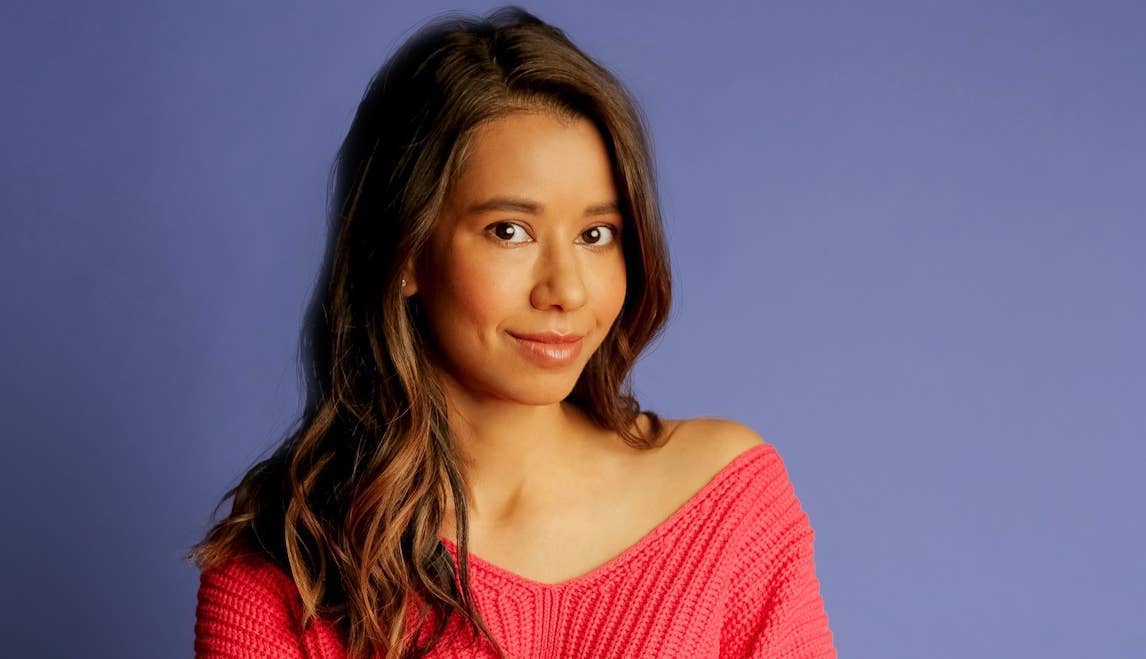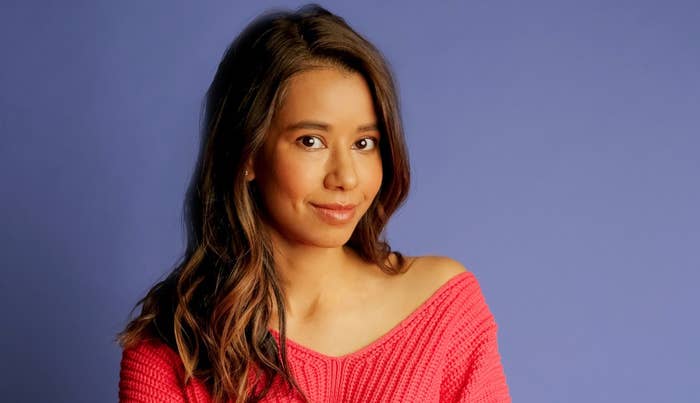
About five years ago, when HBO announced that Issa Rae’s star-making series Insecure, I wasn’t that familiar with her work, which meant I had to go to work. I not only read her autobiography, The Misadventures of Awkward Black Girl, but I dove into her acclaimed web series, Awkward Black Girl, which introduced me to the multi-talented Sujata Day, who played CeeCee and would be portraying Sarah on Insecure. Like any writer worth their weight in No. 2 pencils, I had to do my research and kept my eye on Sujata’s work. Or at least I thought I had.
After Issa leaves We Got Y’all in Insecure—the spot that Sujata Day’s character Sarah also worked—I feel like I lost track of what the Greensburg, Penn. native Day was doing. Come to find out, she was getting her indie filmmaker boots on and marching a dedicated cast and crew to Pennsylvania to make her feature-length directorial debut Definition, Please, a dramedy focused on a South Asian American former spelling bee winner named Monica (Day) who, instead of turning that win into a bigger dream than suburban life, stayed home with her mother and deal with a fractured sibling relationship with her brother Sonny (Ritesh Rajan) while teaching kids how to be spelling bee champs. The film—which is as dry and hilarious as it is emotional—touches on American life in an Indian community, including issues of mental health and finding one’s purpose.
Day not only stars in the Definition, Please but also wrote and directed the film, as well as working as a producer. She has also been all over the festival circuit since the summer of 2020 with Definition, Please, winning the Narrative Award at CAAMFest Forward while also being shown at the Naples International Film Festival, the Boston Asian American Film Festival, the Philadelphia Film Festival, and many others. Definition, Please is actually still killing it on the festival circuit; its official Los Angeles premiere takes place on Saturday, Feb. 27, at the South Asian Film Festival of America.
Ahead of that screening, here’s a conversation with Day that took place about an hour after Issa Rae announced that Insecure would be ending with its fifth season. Day speaks on everything from the multitude of hats she wore during the production and the film’s Bollywood influences to casting LeVar Burton and Lizzie McGuire star Lalaine and her next project.
I want to get this out of the way before we get into anything. I first saw you in Awkward Black Girl, and you were also in Insecure. Did you see the news?
I knew the news. This is something that came up from the writers in the writers’ room. We got called into the office after our table read in Season 3 and [they] said that Issa’s character was leaving the company. We were like, “Oh, no. We’re not on the show anymore, but it’s really sweet of them to give us a heads up,” especially a year before the season drops so that you can really prepare for when people are watching it and she leaves We Got Y’all. We were like, “We’re not sad anymore. We knew about this for a year.” I don’t know when I found out the news, but this was around Season 3 when a lot of the writers were saying that it’s going to be a five-season show.
I truly believe it’s really important for a show to have a specific number of seasons and not to go on indefinitely, and Issa has so many other projects on the books that I’m just excited to see what she does next and I know she’ll grow and tell more amazing stories. I think this is for the best for all of us. I’ve seen a couple of the comments on the Twitter threads like, “Oh, we don’t want it to end.” And I get it. It’s a nice way to wrap up [though]. The rug wasn’t pulled out from under us and this was always the game plan.
Knowing about the work you put into your film Definition, Please and working with Issa, did you ever lean on her for any advice?
I think it was never about specific advice, but just for me being a part of her journey from the very beginning of Awkward Black Girl. I think all of us in the cast and crew really absorbed everything that was happening around us like a sponge because we watched what she was doing—we watched her put Awkward Black Girl on her credit cards and maxing out her credit cards and we would be shooting on the weekends at her dad’s doctor’s office and with her friends from Stanford. It was very much an indie film-type atmosphere and we were all helping each other out.
I think something that really struck me during Awkward Black Girl was when we realized that there was a fanbase, especially of Black women, that was not being catered to. We would just have very casual conversations about, “Oh, I’m writing my Black girl story, you should write your brown girl story.” I think just from going on this journey of Awkward Black Girl to getting a text from Issa when she was shooting the pilot for Insecure on HBO and like, “Hey, girl. There’s a role for you in the pilot. It will get a little bit bigger as the show goes on. Do you want to come in and shoot it?” And I’m like, “Hell, yes, I do.” Just being on set for the shooting of the pilot and realizing what we had come from, from me shooting the hallway scene with Issa and her brother on a video camera that has like a microphone attached to it to being on the set of an HBO show. Looking around and seeing all the men of color and women of color in positions of power and decision-making and creative control, from the PAs to the cinematographers, and just being a part of this entirely inclusive set. That was when people didn’t even talk about inclusion, so that was my normal being on sets, like Insecure. I had come from a utopia situation, and just being around it was inspiring enough to push me to tell my own stories in my own way and also make me not hesitate to put Definition, Please on credit cards.
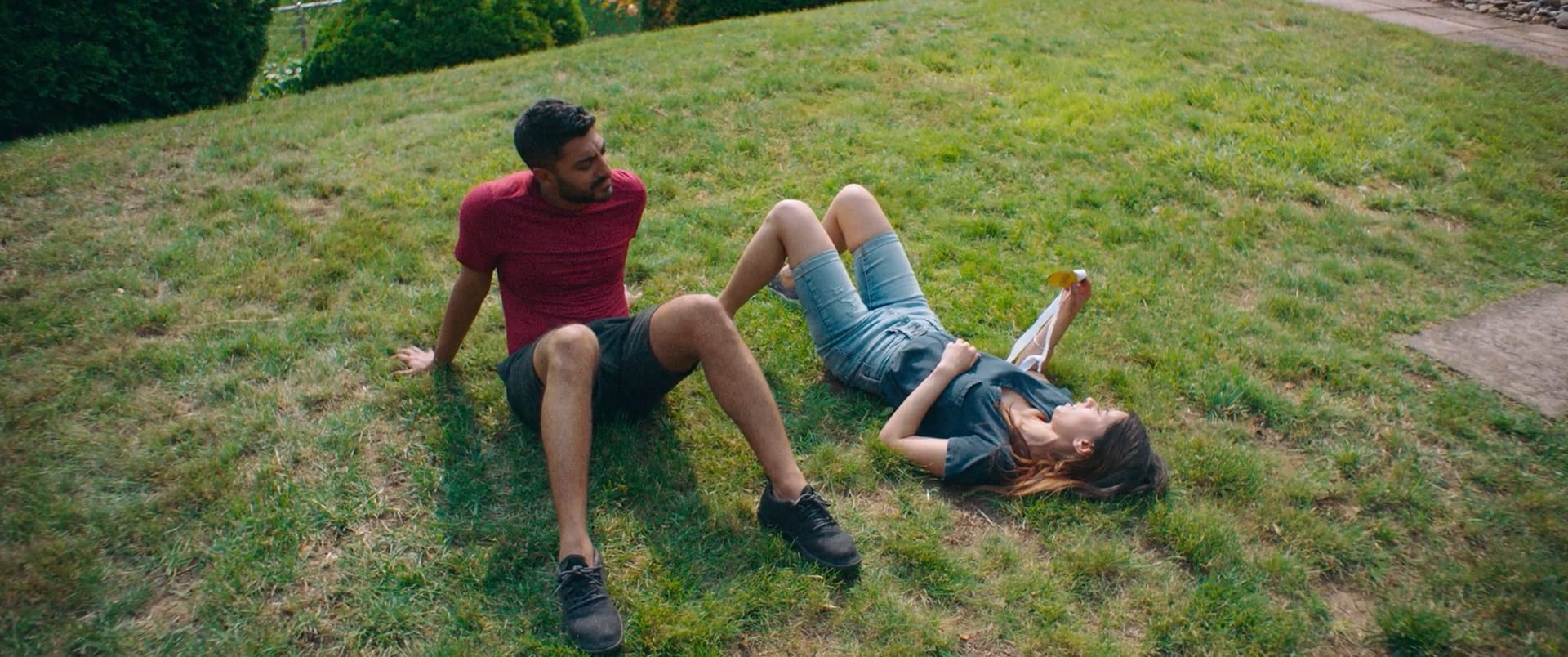
That’s the same thing Spike Lee did. I read one interview where you mentioned that the most difficult part of making this film was raising money. I imagine you didn’t set out to also handle the producer roles, because you’re also the writer, director, and star of the film. I’m going to assume your next feature is like, “You know what? I need someone in that spot.”
I do not want to do that again. That is one part of the producorial aspect that was really the only stressful part of the entire movie-making process. Being a writer, being a director, and being an actor are all very juicy, creative roles that are exciting to talk about. You spend 24 hours a day in those roles being really excited and fired up, so you don’t worry about getting sleep. But something that happened on set was, I would be shooting a 12-hour a day and acting and directing. Then I would get off set and have to get on a phone call with these potential investors and make sure that their money was being transferred into our bank account, otherwise, we wouldn’t be able to shoot the next day. That’s something that I would rather not do in the future, because I would rather take that time to look over the scenes for the next day, to make sure that I know my lines, to put that energy into more of the creative aspect instead of worrying about financial matters of the film.
There’s also the 10,000 hours thing—you need to do the work in order to get to the next level. I’d imagine you’re probably grateful that you at least had that experience and were able to handle that and still make a quality product.
I definitely am proud of what I’ve done. A lot of people aren’t able to raise the money, so they can’t make their film. I came in super well-prepared in terms of sending packets to investors and I had a lawyer on board. It was a lot of work and it’s something that I think every filmmaker should have to do because then you have so much respect for the people who do this on a regular basis; you realize how hard it is. [It's the same thing as wanting] to be a creative director, a writer, or an actor; it’s always good to be a PA, to be an extra, to do those jobs that just get you on set no matter what. You see what it takes to make a TV show or aa film, and you’re aware of all the work that goes into it and all the different cogs that have to make the whole.
Walk me through how Definition, Please came to be.
Everything that I write is inspired by a snippet of my life, so I’ll take that snippet of winning my fourth-grade spelling bee and then going on to lose at regionals and fictionalize that beyond that tiny, real-life thing that happened. In 2015, when I was in my UCB sketch writing class… what was really great about that class is [that] every week, you had to write a new sketch, no matter what. You talked about the 10,000 hours. You just got to keep writing. Half of the sketches were probably terrible. I haven’t really looked back and read through all of them, but this one sketch stayed with me, and it was the “Where Are They Now: Spelling Bee Winners” [sketch] because I just noticed that every year it seemed to be a South Asian American kid winning the spelling bee. Even when we were shooting in 2019, there were eight winners of the spelling bee. Seven of the eight were Indian-American.
Whoa.
So, when I was writing that sketch, that idea just continued to resonate in the back of my head. Going through the Sundance Lab in 2016 also got the creative juices flowing. I got to go to the Sundance Film Festival for the first time in 2017 and one of my friends’ films was premiering there—Justin Chon’s film Gook—and when I watched that film, I was like, “Whoa, I got to make something this. This is cool.” I cornered him at his premiere party and I was like, “How’d you get this made?” And he’s just like, “I did it. I got my friends and family together. They put in the money and we just went out and shot it.” And I was like, “Perfect. That’s what I’m going to do.”
So then, [in the] middle of 2017, like I said that idea of the spelling bee winner just kept coming back to me. And I said, “How can I make this story a little bit bigger? What are the reasons why she didn’t succeed?” That’s what’s answered in my feature and I wanted it to be her relationships with her mom, [and] with her brother especially. I just wanted to explore different things in a family dramedy that I had never seen before onscreen, especially being portrayed by South Asian American characters.
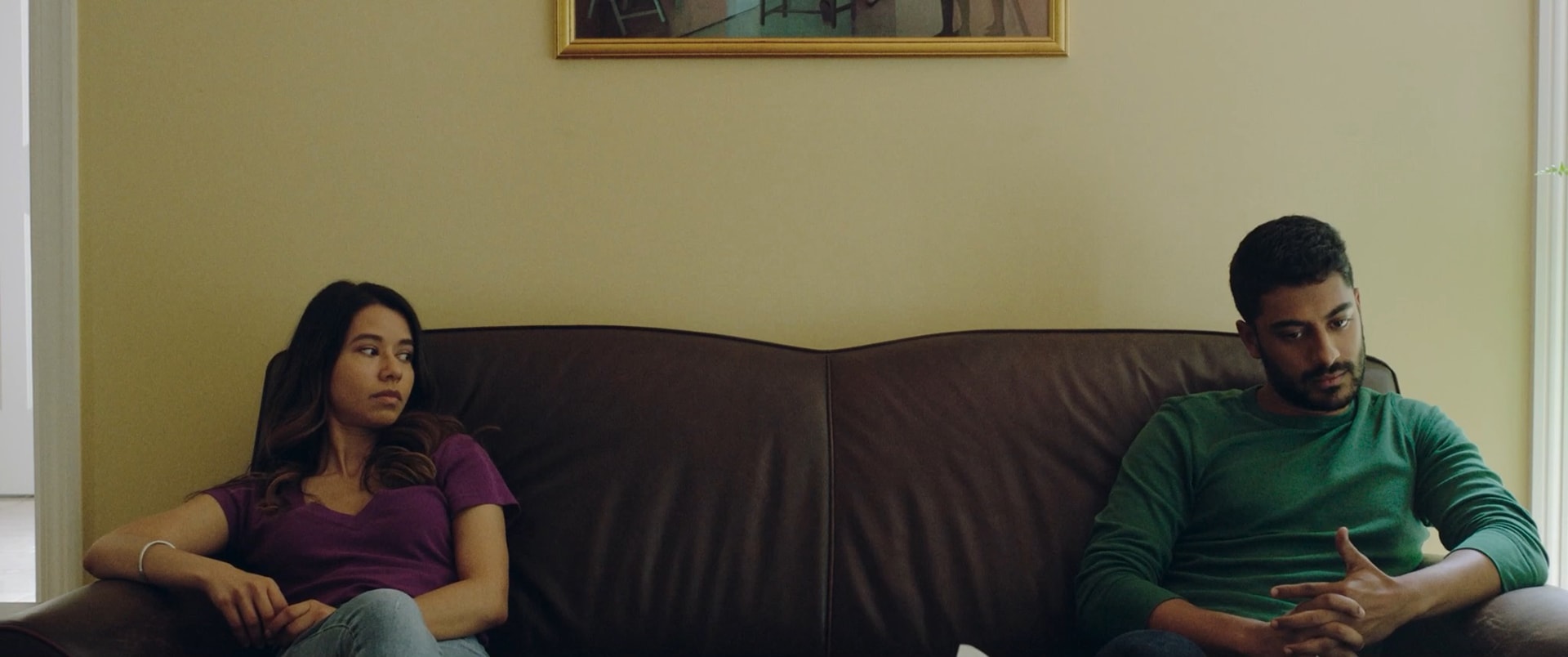
The Hollywood Reporter’s review spoke a lot about the Bollywood tropes that were infused in the film. Was that part of what you were trying to do with Definition, Please?
That was actually really surprising for me to read. I was like, “Oh, this is a cool take on my film,” because I didn’t actually specifically pull from Bollywood and be inspired by Bollywood, but then when I looked back on it, I was like, “Oh, there are a lot of Bollywood elements.” That’s something where like, I grew up on Bengali films and films and watching Bollywood movies, so I think it was subconsciously there. We were very lucky to have an amazing Black woman composer come on board, Amanda Jones who has worked on stuff with Issa Rae, Lena Waithe, and Ava DuVernay. She came on and she read the script and started sending me songs right away, even before we started shooting. And to be honest, I was sending her Bollywood songs.
There you go.
The music is very much inspired by Bollywood tunes that I grew up with, that I loved, that I’ve danced to. Music is a huge part of the film, and in my family and a lot of Indian-American families, there’s just Indian music playing in the background while we’re cooking, while we’re hanging out and even the dance videos are playing in the background. That really started to take shape even before we started shooting. Amanda booked singers from Mumbai to sing the songs and she would send me her renditions after we had perfected the lyrics together and it was really miraculous what was coming out of her.
The flipping of who gets to be sexualized was there, too. Every Bollywood movie that I watched, it’s like the beautiful heroine in a wet saree singing under a waterfall and it’s always a very slow-motion moment, where she’s dancing and just being gorgeous. For me, it was really important to flip that stereotype and put these really hot guys in those positions of the slow-motion and watching them be gorgeous and not much else.
Were there specific directors or films that you drew influence from?
Yeah. Before we went to shoot, my cinematographer Brooks Ludwick and I [would] have a lot of movie dates because that was really important in terms of making sure that he and I were on the same page in terms of the look of the movie, the tone of the movie. That’s something that I think every director should do with their DP regardless.
The script was inspired by a lot of indie American films, the Duplass brothers; three really specific sibling drama comedies that I looked at where You Can Count On Me, The Savages, and Skeleton Twins. In terms of the directorial vision of the film, we had decided early on that I wanted handheld cinematography because I just wanted it to be fluid and flowing and we watched Wong Kar-Wai films. A big inspiration was Monsoon Wedding in terms of the tone. Films [like] Y tu mamá también that are very flowy, character-driven. When you see these films, you feel like you’re just watching a slice of life. A lot of Definition, Please was inspired by just like having a documentary feel, but if we were all sticking to the script.
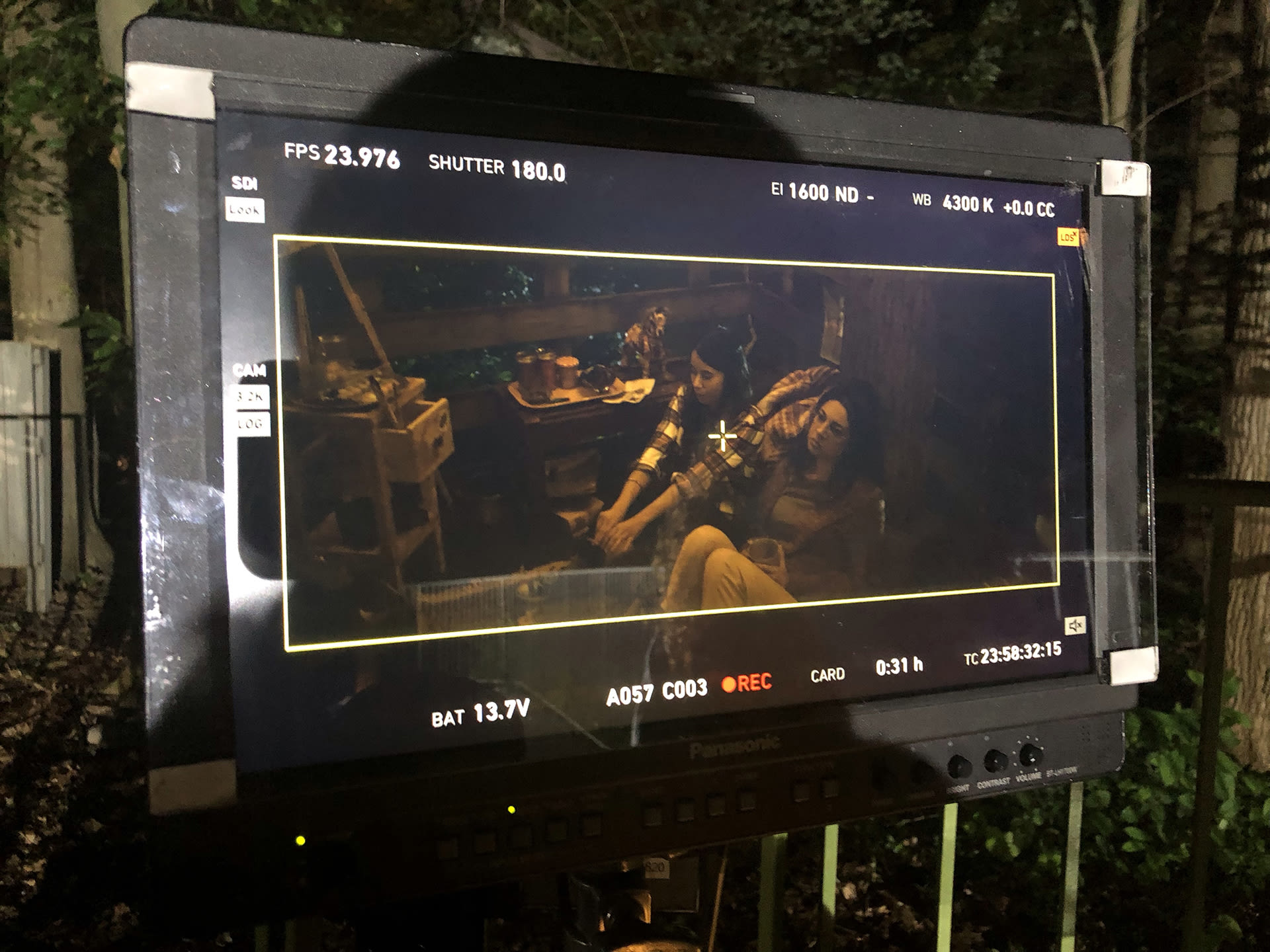
I’m glad you mentioned the handheld feel. There’s the one scene with Monica and her mother in the treehouse passing a joint and I’m like, “Where the hell was that camera?” It felt it was so tight up there.
You’re absolutely right. There were some tight spots especially in the treehouse, and the day we shot at the treehouse was full of a lot of drama. It started raining, and you have to protect the camera and all the equipment and the lights from the rain. We didn’t have a ton of time to do a lot of takes, so we just get the wide, and then we’d have Brooks come into the treehouse and he would just kind of figure out a way to get us both in the shot. And yeah, we wanted it to have that intimate feel of you, the viewer, the audience being there with us.
I read that you shot Definition, Please in about two weeks. Some of these scenes are hilarious, like Monica and Sonny putting on the whole show for their mother. I can’t imagine how many takes were you doing with such a tight window.
I think we did three takes of that whole show. We just went through the whole show and we wouldn’t really stop. We’d just allow the mistakes to happen, and you know what? As an actor, I feel like there’s a lot of magic that comes out of mistakes, so you see a lot of that in that particular segment. You’re right: We didn’t have a lot of time, so we would get Anna Khaja’s character and we would make sure to get her reactions, [then] we shot the talent show, and then we would go behind the curtain. Those are some of my favorite shots in the film; you’re behind the curtain seeing what’s happening with the siblings back there.
I actually never really felt rushed and I think that’s a testament to the actors that I had on set where they would just come, Ritesh and Anna and Lalaine and Jake. They would just come fully prepared and allowed us to only have to do two or three takes of everything, so it was really great in that aspect.
I’m glad you mentioned some of the cast. I wanted to know the stories behind two castmembers in particular. First, how the hell do you cast LeVar Burton?
This is a really great story. About four years ago, a couple of Black and brown friends, we started a Blerd Brunch. Every Sunday, we would go to this restaurant and hang out and have brunch on Sundays. Most of the time, we wouldn’t even talk about the industry. These were all creatives—actors, writers, producers, executives—and we’d just be there and talk about movies and comic books and family stuff.
I believe it was about a year or two into us doing this every Sunday and LeVar Burton walked by the restaurant that we were in. Yvette Nicole Brown is one of the Blerds, and she spotted him. It was like, “Oh, my God. I’m going to go say hi to LeVar. I’m a friend.” Of course, she’s friends with everybody. So, she went and pulled LeVar in and introduced him to the rest of us and he joined the brunch that day. He pulled out his phone and was like, “Let me get everyone’s phone number.” And I was like, “What is happening?”
That’s amazing.
He’s just so cool, and he’s been a part of this Blerd Brunch and also, so many of the Blerd Brunches. It’s weird to call them members because they’re my friends, but they became producers on the film as well. They helped me finish the film and they became executive producers and associate producers, along with Yvette Nicole Brown and Malcolm Barrett, who you might know from Timeless and a bunch of other shows.
As I was casting the film, I was like, “I have this talk show type character written into the opening of Definition, Please. You know what? I’m going to rewrite this and fit it to LeVar.” He had given us all his phone number, [so] I texted him and said, “Hey, I’m shooting this film. Would you want to come in for a day? I’ll send you the script.” He read it and he was like, “Sure, I’ll come in and do it.” Didn’t even have to go through reps or anything. He [just] came in and he shot the scene. Afterward, he gave me a huge compliment. He said, “No one’s ever been so good at writing my voice from that time period and it was such a perfect monologue.” I was like, “Oh my God.” It was a very small shoot on a green screen. He just kind of stood there and he’s like, “Okay, so does anyone want a picture with me?” So everybody just got to take a picture with LeVar Burton and he was so kind and open and he’s been so lovely.
Since then, I’ve worked with him on This Is My Story, which is a short web series with him narrating everyday racist experiences of just regular people. That has been really fulfilling to work with him on that, and we’re talking about the next season of that. We’re in constant communication; we’ve really established a wonderful working relationship. I consider him a friend.
That’s awesome. Very serendipitous, you know what I mean? You put in the work and it comes back to you when you need it. Now the other name I wanted to mention was Lalaine, who plays Monica’s friend Krista. I might have been a little too old for the Lizzie McGuire days, but her face is immediately recognizable. It’s good to see her in a film like this and actually be able to be a character of substance. How did she get cast?
[When] I was writing the Krista character in my film, based on two of my best friends from childhood, she was the first person that came to mind to play this role. I was talking to my producer, I said, “Do you think she’ll even want to act again?” And he said, “You know what? Just hit her up. See what she says. The worst thing she can say is no.” So, I texted her and then I sent her the script. The next day, she texts me. She was like, “I was crying. I felt it. It’s such a beautiful script. I’d love to be a part of it.” It was pretty easy to get her on board. She came and did some rehearsals and then when we came out to shoot in Greensburg, she just had a blast and I don’t think she’d ever been in this area before. I obviously didn’t have time to hang out too much with the cast and crew, but I always enjoyed it when the cast and crew went out and did their own thing and went into Pittsburgh to do fun Pittsburgh-type things. I think a bunch of them went to a Pirates game. She was hanging out with the cast and going on little excursions and she just had a really great time and she was so perfect in that role and so lovely and giving and I would love to act with her again and cast her again in something.
You also have a newcomer, Maya Kapoor, who was awesome as Payal. Where did you find her?
With Maya’s character Payal, her mom is so forceful with her. Even during the spelling bee, I never trained or studied for the spelling bee. I just read a lot of books and happen to be a decent speller. I won the spelling bee on a fluke. So, I really wanted to explore the character of a kid who is being pushed by her mother and she did such a good job. What happened was I ran into her. Her mom in the movie is her actual mom.
Wow.
Yeah, I ran into her mom at an Indian grocery store in Los Angeles and she had her daughter with her. This was right around when we were casting the film. And I was like, “Does your daughter act? Because she would be perfect for this role.” And she was like, “Yeah, she does plays at school and she would be great.” And she’s like, “Do you want her to audition?” And I was like, “No, that’s fine. I don’t need her to audition.” Nobody auditioned. I had rehearsals with all the actors before going to shoot in Greensburg, we were just rehearsing in my apartment in Los Angeles. With Maya, we didn’t necessarily go over the lines, we just did a lot of improv exercises, because I wanted her to be free and to be in the moment and be a kid. She was great.
True indeed.I was going to ask how you’ve been handling quarantine, but it seems for at least the second half of the year 2020, you’ve been on the virtual festival circuit. When did you first start showing the film?
Our premiere was Bentonville Film Festival in August and we had to go through a lot of adjustments in terms of film festivals. We were ready to go on the festival circuit live and travel to all these different film festivals and we had to make a decision of whether or not we wanted to do the virtual circuit or if we wanted to hold out until COVID was cured.
Whenever that happens.
Listen, thank God we didn’t hold out and the virtual festival circuit has been so welcoming and amazing and it’s a way to get the buzz out about smaller films. Something that honestly worked in our favor was all these blockbusters getting pushed or going straight to streamers and then reviewers were like, “Oh, well, what are we going to talk about now?” It was really exciting to just come out, do the festival circuit, see what the response was, and play at these really welcoming film festivals. A lot of these South Asian film festivals and Asian American film festivals and female filmmaker festivals have just been really open and kind and we’ve been doing panels. It’s just been really great and, in terms of it being during quarantine, it’s nice because it feels like I’m busy with something.
Last year, I had a conversation with Mikey Alfred about his film North Hollywood, which has a lot of buzz but has still not gotten distribution as of yet. For you, was the plan always to make the film and hit the festival circuit, or would you have preferred to go a different route for Definition, Please?
The other route is always preferable because I do believe that watching a film in a theater with audience members that are reacting alongside you, that are laughing with you, that are crying with you, that are gasping with you, you don’t get a feeling like that from home. That’s something where, as a first-time director, I missed out on all of that. The distribution thing is really difficult and it’s been challenging, but I feel positive about it because even this morning, I got off the phone with someone in acquisitions and had a whole long meeting about it.
I believe that there’s a space for everything. You mentioned serendipity and a lot of serendipitous things have happened with the film in general. One of my producers, his brother works at Skywalker Sound. He did our sound at Skywalker and I sat in George Lucas’s seat in the theater. That’s something that I’m never going to forget. When our Deadline announcement came out on the first day of shooting, we didn’t have a post-production place on board, and my DP was talking about EFILM. I looked up EFILM and I’m like, “They’re going to do the Avatar movies. How are we going to be able to afford EFILM to do our color and our posts?” And out of the blue, EFILM hit us up a week after the Deadline article dropped. When you talk about serendipity, those are the things that were happening because of the hard work that I had already put in.
For me, yes, obviously, we want this film to be seen by a wider audience, but the journey of making the film has been so fun and fulfilling that I wouldn’t trade that for anything. I’m also learning so much. I’m meeting so many people. Even if a distributor passes on the film and they’re still saying kind words about it, “We’re going to keep an eye on you and come to us with your next project.” That’s a win. We’re staying positive; we’re communicating with a couple of different streamers and distributors right now and it’s been really exciting.
It’s like it’s being an actor. We’ve gone through so much rejection as actors. I get rejected 10 times a week for different roles. You [learn to] let that slide off of you. I’m treating this film in a similar fashion where I’m not taking any of the rejection or the passes personally; you only need one yes. We’re just waiting for that one yes, and I believe that it will happen.

You mentioned distributors talking about wanting to see your next project. Have you thought about what the next film is going to be? Do you have that script ready?
So, at the beginning of quarantine, this summer, I wrote my second feature. It’s out to actors right now in terms of casting. It’s a really fun absurd comedy that I’m excited to get out there. It is something that can be shot during the quarantine. I [also] just wrote my third feature over the holidays. It’s the first draft, what I always call a vomit first draft. I’m working on that as well and then I have like two TV shows; one show at a studio and another show with a production company and we’re going to take those out to pitch and it’s been busy and exciting from a creative point of view.
Do you plan on pulling another Definition, Please, directing and starring in the next feature?
Yeah, I’m planning on starring and directing. It was really fulfilling to direct Definition, Please and I’d love to do it again and keep doing it and just be the Indian Issa Rae or the Indian Phoebe Waller-Bridge and just keep things going.

